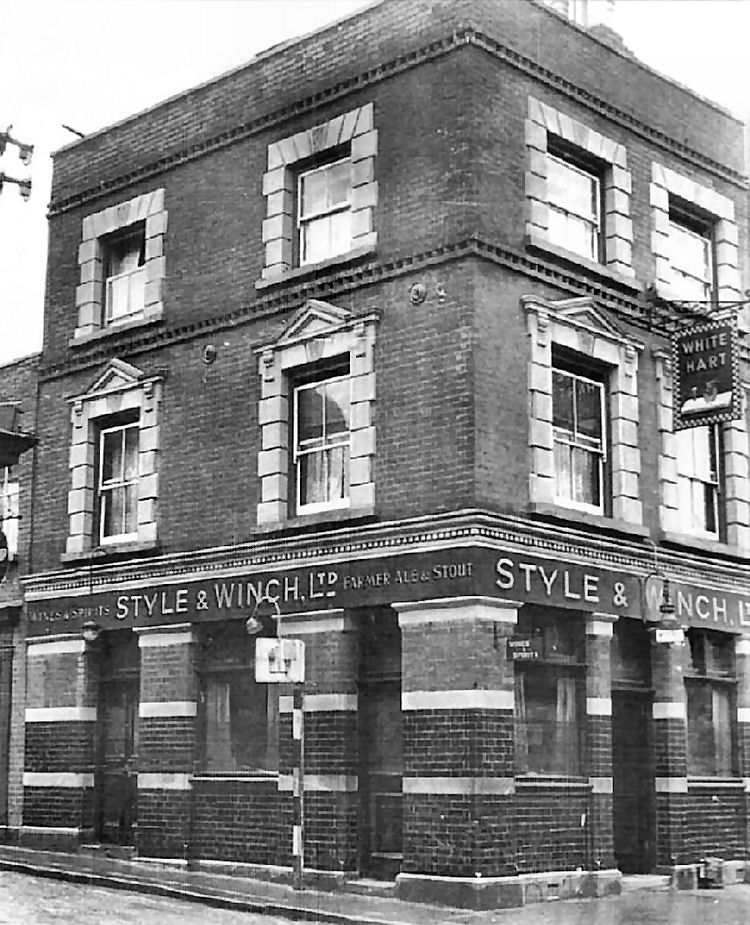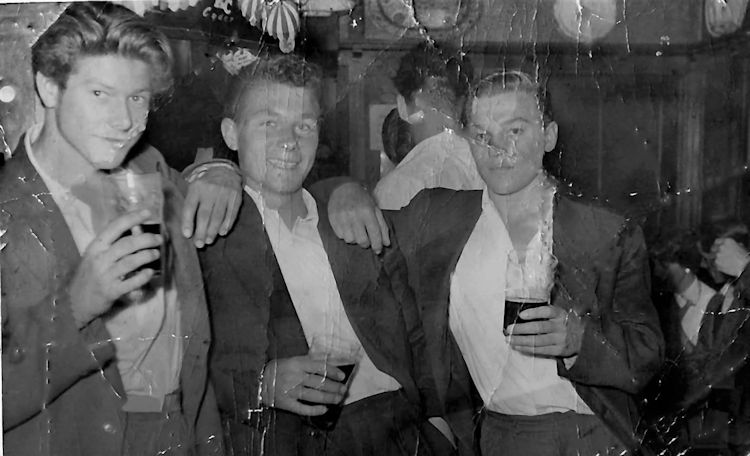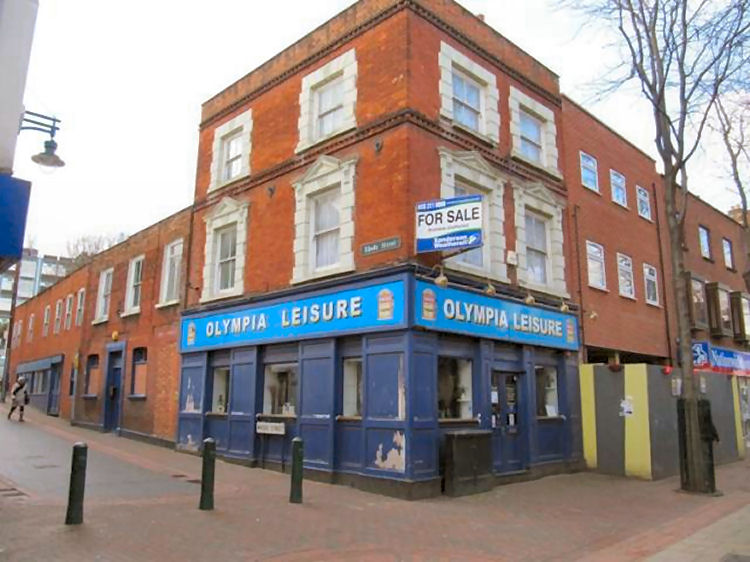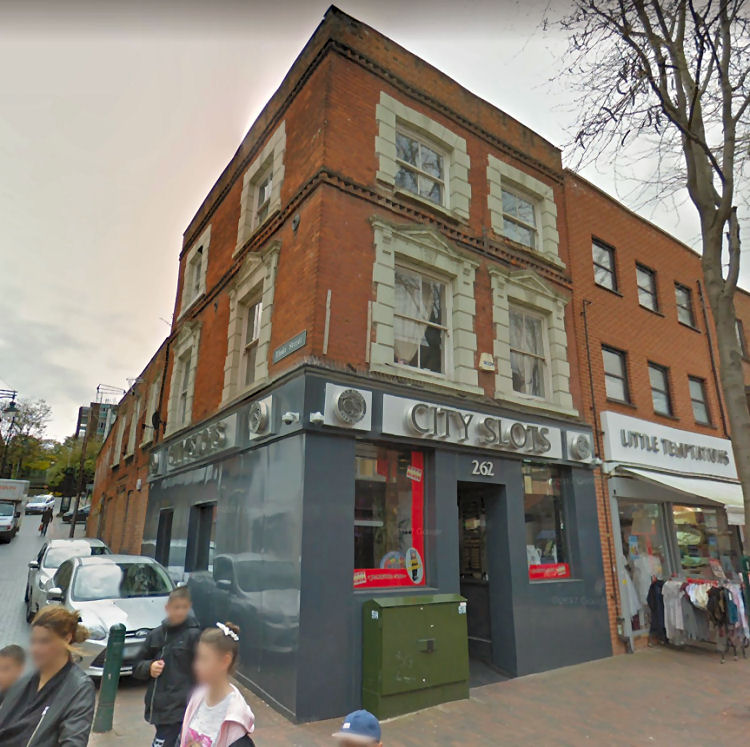|
262 High Street / Rhode Street
Chatham

Above photo circa 1930, kindly supplied by Tony Smith. |

Above photo, circa 1955, names unknown. |

Above photo 2015 by Darkstar. |

Above Google image, 2017, showing 262 High Street. |
The pub was situated at the corner of Rhode Street. In the 1874 directory
and before the address was 237, but in 1881 it was addresses as number 3.
I also have reference to a "New
White Hart" also in the High Street, and also an "Old
White Hart" at 31 Brook Street, but as yet don't know the connection
between them.
|
From the Kentish Gazette, 1 June 1810.
DEATH.
May 27, at an advanced age, Mr. Hinckley, late of the "White Hart,"
public house, Chatham.
|
|
Early reference in 1818.
The middle borough took in all properties east of Globe Lane and
Rome Lane, up to the boundaries of the East Borough. Its register
commenced at the east side of Globe Lane in which was situated...
along the north side of the High Street... "White Lion." With only the
"Crown and Thistle," "Mitre Tavern,"
"Navy Arms," "Brewers Arms," The
"Woolpack," "Darmouth Arms," The
"Fountain" and the "White Hart" on
the south side.
(1818)
|
|
Kentish Gazette 5 May 1819.
Death.
May 2, at Chatham, Mrs. Eden, wife of Mr. Eden of the "White Hart."
|
|
Maidstone Journal and Kentish Advertiser, Tuesday 26 November 1844.
Whereas, a petition of John Robert Alexander, formerly of the "Lower
Bell Inn," Aylesford, Kent, licensed victualler, then of "Kits Cotty
House," Aylesford, aforesaid, out of business, then of Moat Road,
Maidstone Kent, out of business, and then of the "White Hart" public
house, Chatham, Kent, licence victualler, and late of the same place,
waiter, having been filed in the Court of Bankruptcy and the Interim
Order for Protection from Process having been given to the said John
Robert Alexander, under the provisions of the statute in the case made
and provided, the said John Robert Alexander is hereby required to
appear in Court before Edward Holroyd, Esq., the Commissioners acting in
the matter of the said Petition, on the 12th day of December next, at 11
o'clock in the forenoon precisely, at the Court of Bankruptcy,
Basinghall Street, London, for the purpose of his first examination
touching his Debts, Estate, and Effects, and to be further dealt with
accordingly to the provision of the said estate; and notice is hereby
given, that the choice of Assignees is to take place at the time so
appointed.
All person's indebted to the said John Robert Alexander, or that have
any of his effects, are not to pay or deliver the same but to Mr. James
Foster Groom, No. 12, Abchurch Lane, Lombard Street, the Official
Assignee, nominated in that behalf by the Commissioner acting in the
matter of the petition.
James Johnstone. Messenger.
|
|
Kentish Gazette, 7 December 1847.
ROBBERY AT CHATHAM BARRACKS.
At the County Magistrates’ Office, Rochester, on Wednesday, the 24th
ult. John Prophet and Peter Robinson, both privates belonging to the 63d
Regiment, stationed at Chatham Barracks, were charged with stealing a £5
Bank of England note, from a box belonging to Lance-Sergeant John
Prophey, of the same corps, which note had been entrusted to him by
Lieut. L. V. Reynolds, the officer who commands his company, to pay the
soldiers of the company with. The Sergeant said that at seven o'clock on
Saturday evening the Bank-note was safe in his box which stood at the
head of his cot in the Barrack-room; that at eight o’clock he went to
the box to get his pay list out, and he then missed the little bag which
contained the note. The two prisoners occupied quarters in the same room
with him; and at half-past seven o’clock the prisoner Prophet asked him
if he should make his bed down, which he allowed the prisoner to do. The
box at that time stood with the lid up, and when he missed the money
both prisoners were gone, and as they were absent at tattoo suspicion
fell upon them that they had stolen it. He went in search of them; they
were however taken by the picquets during the evening and lodged in the
guard-house; and on searching the prisoner Prophet the bag that
contained the £5 note was found in his trowsers pocket. Evidence was
also given that the prisoners were together that night at the "White
Hart" public-house, in the Brook, at Chatham, and there offered a £5
note in payment for some beer, but the landlady, Mrs. Chambers, could
not give change, and she gave the note back again to one of the
prisoners, who sent the waiter out to get change elsewhere, and the
waiter procured five sovereigns from Mrs. Butcher, at the "Golden Lion
Inn," as the waiter said for his master. The waiter did not return with
the change, and he has not been seen since. Mrs. Butcher produced the £5
note, but the sergeant could not identify it as the one he had lost. The
prisoner Prophet confessed to the robbery, and Robinson said he was led
into the scrape. Both the prisoners were committed for trial at the
Quarter Sessions at Maidstone.
|
|
From the Kentish Gazette, 5 September 1848.
August 31. Desperate Case or Self-Destruction.
Yesterday afternoon a coroner's inquest was held by J. Hinde, Esq., one
of the county coroner’s for Kent, at the "White Hart" public-house,
High-street, Chatham, touching the death of Mrs. Elizabeth Noakes, the
wife of a carpenter residing at No. 5, Rhode-street, who cut her throat
with a razor. It appeared that the deceased and her husband occupied
furnished apartments at the house of Mrs. Eastwood. Some words passed
between the landlady and the deceased, which induced Mrs. Eastwood to
make a complaint before the county magistrates, and the bench, upon her
statement, granted a summons for the deceased to appear to answer the
assault. The deceased, hearing that the constable had the summons to
serve upon her, became much excited, and she declared she could not go
before the justices. As the day approached for attendance, at 12
o'clock, which was Friday, her spirits were much affected; and the
deceased's daughter, who is married and lives close by her mother,
seeing on Friday morning, a little after 11 o'clock, that the window
curtains of her mother’s bed-room were not undrawn, proceeded to the
room, and found her mother standing up by the bedside, behind the door,
undressed, and seeing a hand-basin on the dressing table with blood she
asked her mother what she had done, and finding that she could not
speak, she took a wrapper from her neck, and found that her throat was
cut. She immediately alarmed the neighbourhood, and Mr. Steddy, surgeon,
was soon in attendance, and sewed up the wound and bandaged it. In the
blood in the basin was found an open razor. The deceased had told Mrs.
Robinson, a neighbour, the , day after she had cut her throat, that on
the Thursday she had taken three pennyworth of poison, which had made
her sick. Mr. Edward Steddy, surgeon, who attended the deceased, said
the cause of death was owing to the great loss of blood, causing
considerable exhaustion, together with a sudden attack of the bowel
complaint, which verdict the jury returned.
|
|
From the Kentish Gazette, 5 December 1848.
CHATHAM. Military Affray at Chatham.
On Saturday evening some serious effects were anticipated in consequence
of some men belonging to the Royal Marines manifesting a disposition of
violence at the "White Hart" public-house, in the High-street. Being,
however, foiled in their object at that house, they left and entered the
tap-room at the "Woolpack," where some men belonging to the 17th
Regiment and some soldiers of the Provisional Battalion and civilians
were sitting. A soldier of the Marine Artillery, and a private of the
Marines, entered first and asked who had any thing to say about a "Pig
Marine," and not meeting with a reply, and the landlady refusing to draw
them any beer, a signal was given, and immediately from 30 to 40 marines
entered the tap-room and commenced fighting with every one present.
Resistance was offered, and a serious disturbance ensued; every sort of
weapon was seized in defence, and blood flowed pretty freely from those
who received wounds. One marine had his nose split from the blow of a
pewter pot, and the tap-room tables and flooring were marked with blood
in several places. The police-constables were sent for, who, seeing the
violence of the soldiers, sent an express to the barracks for
assistance, and but for the timely arrival of about a dozen pickets
together with the inlaying picket, commanded by an officer, some lives
would have been lost, as there was nearly a thousand civilians
collected, some taking one part and some the other; but owing to the
orderly conduct of the men of the several pickets the ringleaders were
secured and marched off to the guard room. No blame whatever attaches to
either the men of the 17th or the Provisional Battalion in provoking the
outrage. They were sitting quietly and were sober when their assailants
came in. This affair is to be investigated by the commandant. The
landlady of the "Woolpack" has identified the marine artillerymen and
also the marine as the ringleaders.
|
|
From the Maidstone Telegraph, Rochester and Chatham Gazette, Saturday 10 March, 1860. Price 1d.
KENT QUARTER SESSIONS
Henry Baker, a lad, for stealing at Bromley, on the 5th Jan., a coat, 10
handkerchiefs, 7 scarves, 2 shirts, several neck ties, and other
articles, value 40s., the property of Samuel Porter. Mr. Russell for the prosecution. Mr. Biron for the defence. Joseph Jessup, shop-boy to Mr. Porter, said his master had some woollen
scarves in stock shortly before Christmas. The prisoner had been in the
habit of coming to the shop. He used to come about half-past eight in
the morning. Sometimes he used to sit on a box, near the window and near
the goods. He used to stay and chat about a quarter of an hour. Witness
sometimes had occasion to leave the shop. On Wednesday, after Christmas,
witness asked prisoner whether he had got the servant's handkerchief. He
gave witness her handkerchief to take down to her, and told witness to
ask if she had his handkerchief. He then requested him to go down again;
he did so. Witness was away from shop the first time about ten minutes,
and only a few minutes the second. The scarves were missing just before
Christmas. None of them had been sold to the prisoner. Shortly before
Christmas his master had some great coats in stock also. No coats had
been sold to the prisoner. Witness was generally in the shop, but not
always. By Mr. Byron:- The prisoner was a friend of his and used occasionally to
come into the shop to chat with witness. He (witness) was only shop-boy.
When he first went to the shop the prisoner used to purchase articles,
but had not purchased any to his knowledge during the last twelve
months. Re-examined:- There were two doors to the shop, which he used to fasten
when he left. Francis Brooker, the wife of James Brooker, of the “White Hart Inn,”
Bromley, said the prisoner had been lodging at her grandmother's, and
also slept in her house on the sofa occasionally. He had a small box at
her house and a larger one at her grandmother's. About a fortnight
before Christmas the prisoner brought to her 3 scarves, and 4 silk
pocket handkerchiefs, and asked her to sell them for him, saying he was
out of a situation, and wanted to get to London. She sold the scarves,
there were 7 in all, and gave the money to the prisoner. There were two
in a piece that had not been cut. She sold 3 to Mrs. Ellis, at 1s. each,
and 2 more to Mrs. Boorman, and left with that person 2 other scarf's,
and 2 silk handkerchiefs, for her to sell. The articles were sold and
the prisoner received the money. A short time after this Mr. Porter came
to her, and in consequence of what he told her she looked in the
prisoner's box and found 6 neckerchiefs there. Jane Boorman, deposed to purchasing 2 scarf's from Mrs. Brooker, and
said, that person gave her 2 silk handkerchiefs to sell, she sold them
to Mrs. Brister for 2s. each, and sent the money to the prisoner. Alfred Boorman, a little boy, stated that Mrs. Brooker gave him some
handkerchiefs and scarf's to sell. He sold 2 scarf's to Mr. Mitchell foe
1s. 6d., and 2 to Mr. Batchelor for 2s., and took the money to Henry
Baker (the prisoner). Thomas King, a police sergeant at Bromley, said he apprehended the
prisoner at his mothers house, and on searching his box he found it in a
great coat and two cotton shirts, (produced). When at the police
station, he took from the prisoner a new vest and scarf, which he was
wearing. The remainder of the articles witness obtained from the above
named parties. Most of the articles were identified by the prosecutor as
his property, and the prisoner was found guilty and sentenced to 6
months' hard labour. |
|
South Eastern Gazette, 24 April, 1860.
Wednesday. (Before the Rev. G. Davies.)
William Marsham Milton and George Walker Bartlett, privates in the
53rd Regt., were charged with robbing a private of the 73rd Regt.,
named John Orill, corporal, of a purse containing three sovereigns.
Prosecutor said he was in a room in a cottage at the back of the
"White Hart" public-house, Chatham, on Monday evening, and after he
had been there about five minutes the two prisoners and another
soldier ran in. He was quite positive the prisoner Malton was one of
the men, but was not sure as to the other prisoner. The instant the
three men entered the room they rushed on prosecutor, when Milton
placed his hand on his mouth to prevent him calling for assistance.
Feeling sure that the object of the men was to rob him he took his
purse, which contained three sovereigns, out of his pocket, and held
it tightly in his hand. The men, however, overpowered him and got
his purse out of his hand. Prosecutor could recollect that the
prisoner Milton took the purse from him, and all three then made
their way out of the house, followed by prosecutor, who traced them
to the "Swan" public-house, where he lost sight of them. During the
time Milton was taking the purse from him he gave him a violent blow
in the face with his fist.
Charles Wier, a private in 73rd Regt., said he was in the "Swan"
public-house on Monday evening, when he saw the prisoner Milton and
two other soldiers rush through the tap-room into a rope-walk at the
back. Witness followed them and heard them talking, but it was too
dark for him to distinguish who they were.
At this stage of the proceedings the prisoners were remanded until
Friday.
|
|
South Eastern Gazette, 24 April, 1860.
Friday. (Before the Rev. G. Davies and W. A. Nicholson, Esq.)
William Matthew Milton and George Walter Bartlett, the two soldiers
of the 63rd Regt. who stood remanded on a charge of robbing, with
violence, a soldier of the 73rd Regt., of a purse containing £3 and
an Indian coin, were brought up for final examination, and committed
for trial.
|
|
South Eastern Gazette, 31 July, 1860.
Robbery from the Person at Chatham.
George Matthew Milton, 22, and George Walter Bartlett, 20, soldiers,
were charged with having stolen certain money from John Oriel, with
violence, at Chatham, on the 16th April. Mr. Lilley was for the
prosecution, and Mr. Ribton appeared for the prisoner Milton.
The prosecutor said that in April last he was a corporal in the 23rd
Regiment at Chatham. On the evening of the 16th of that month he was
in a cottage at the back of the "White Hart" public-house. While
there, three soldiers came into the room; one of them he recognised
as the prisoner Milton. Two of them immediately rushed upon him,
when Milton put his hand over his mouth, and rifled his pockets. He
had a struggle with Milton for his purse, which contained three
sovereign and a small Indian coin. Milton ultimately got possession
of it, and all of the men then ran away; Milton, before leaving,
striking prosecutor a blow in his face. He, however, ran after the
men, and followed them into the "White Swan," and through the house
into the back of the premises, where he lost sight of them.
Three soldiers were called, who were sitting in the taproom of the
"White Swan" when the three men ran through, two of whom spoke to
Milton as being one of them, and one to the prisoner Bartlett.
Two witnesses, also soldiers, were called on behalf of Milton, who
distinctly swore that they were drinking with him at another house
at the time the prosecutor stated the robbery to have been
committed; and one witness gave similar evidence for the prisoner
Bartlett.
The jury acquitted the prisoners.
|
|
Maidstone Telegraph, Rochester and Chatham Gazette, Saturday 4th August 1860.
Robbery from the person at Chatham.
George Matthew Milton, 22, and George Walter Bartlett, 20, soldiers,
were charged with having stolen certain money from John Oriel, with
violence, at Chatham, on 16th April.
Mr. Lily was for the prosecution, and Mr. Ripton appeared for the
prisoner Milton.
The prosecutor said that in April last he was a corporal in the 23rd
Regiment at Chatham. On the evening of the 16th of that month he was in
a cottage at the back of the "White Hart" public house. While there,
three soldiers came into the room; one of them he recognised as the
prisoner Milton. Two of them immediately rushed upon him, when Milton
put his hand over his mouth, and rifled his pockets. He had a struggle
with Milton for his purse, which contains three sovereigns and a small
Indian coin. Milton ultimately got possession of it, and all of the men
then ran away; Milton, before leaving, striking prosecutor a blow in his
face. He, however, ran after the men, and followed them into the "White
Swan," and through the house into the back of the premises where he lost
sight of them.
Three soldiers were called, who was sitting in the tap-room of the
"White
Swan" when the three men ran through, two of whom spoke to Milton
as being one of them, and one to the prisoner Bartlett.
Two witnesses, also soldiers, who called on behalf of Milton, who
distinctly swore that they were drinking with him at another house at
the time the prosecutor stated of the robbery to have been committed,
and one witness gave similar evidence for the prisoner Bartlett.
The jury acquitted the prisoners.
|
|
South Eastern Gazette, 30 October, 1860.
Robbery of 200 Sovereigns.
On Wednesday last Charles Castles, a private in the Chatham division
of Royal Marine Light Infantry, was charged before the magistrates
at Rochester, with being concerned, with two other men not in
custody, with stealing 200 sovereigns and some other money belonging
to Mr. Thos. Greenslade, landlord of the "White Hart" public-house,
Brook, Chatham. The robbery was effected about a fortnight since,
and the prisoner immediately afterwards deserted. The prisoner,
together with several other marines and troops of the line, were
drinking in prosecutor’s house on the afternoon and evening of the
night of the robbery; the cash-box, which contained upwards of £200
in gold, a few pounds’ worth of silver, bank notes, and some
documents, being at the time on the drawers in an upstair bed-room.
During the evening a row was got up between the men drinking in the
tap-room, and it was then that the robbery was effected, prosecutor
being engaged some time in quelling the disturbance. At about twelve
o’clock that night the cash-box was found to have been broken open,
and on being examined it was discovered that upwards of 200
sovereigns had been abstracted, together with some silver; about £55
bad been left behind. Some time before the robbery the prisoner
slept in the house, and on the landlord going upstairs he found him
in his bed-room, when prisoner apologised by saying he thought he
heard one of his comrades calling him. A night or two after the
robbery had been effected, a soldier of the 30th Regt., named
Lawrence, entered the Marine barracks and asked for the prisoner, at
the same time producing about 70 sovereigns, stating that prisoner
and a man named Simpson had a similar amount. On the same evening
prisoner and Lawrence were at the "King’s Arms" public-house,
Holborn-wharf, where they were conversing about the robbery.
Lawrence was heard to say prisoner had arranged the robbery four
days before it took place, and that when everything had been
prepared prisoner and himself got into the room through the window
and carried off £207. A marine named Simpson was "in" the robbery,
and had his share. Both Lawrence and Simpson had deserted and had
not yet been apprehended. The prisoner also deserted after the
robbery, but was apprehended by a city police-constable, when he
denied all knowledge of Lawrence, and likewise denied ever having
been at the "White Hart" public-house. On crossing Rochester-bridge
on his way to the station-house the prisoner was observed to take
something from his pocket and throw over the bridge into the river.
A few days after a boy named Colley, residing in John-street,
happened to be searching among the mud in the river, when he picked
up a purse containing 44 sovereigns and a half, which was no doubt
what the prisoner had been seen to thrown over the parapet. The
prisoner was fully committed for trial.
|
|
|
LICENSEE LIST
HINKLEY Thomas 1793-27/May/1810 dec'd

EDEN Mr 1819+
CLIFFE James 1828+

MUNNS J 1828+

LEADBITTER James 1832-38+
 
 ALEXANDER John Robert to 1844
ALEXANDER John Robert to 1844
CHAMBERS Mrs 1847+
BENNETT James 1858+
BROOKER James 1860+

BENNETT James W 1861-62+ (age 53 in 1861 ) )
BENSTER Thomas 1871-74+ (age 50 in 1871 ) )
BENNETT James 1879+
SHARP Christopher 1881+
 (widower age 45 in 1881 (widower age 45 in 1881 ) )
BARRICOTT William J 1891+ (age 44 in 1891 ) )
WENMAN Richard William Henry 1882+
BARNICOTT William J 1891+ (age 44 in 1891 ) )
CLOAK Alfred 1901-03+ (age 48 in 1901 ) )

BAKER Caleb 1913+
BELCHER Charles A 1922+
DENYER Herbert F 1930-38+
SMITH E A 1955+
BRETT M E 1953
https://pubwiki.co.uk/WhiteHart.shtml
http://www.closedpubs.co.uk/whitehart.html
 Universal
British Directory of Trade 1793 Universal
British Directory of Trade 1793
 From the Pigot's Directory 1828-29 From the Pigot's Directory 1828-29
 From the Pigot's Directory 1832-33-34 From the Pigot's Directory 1832-33-34
 From the Kelly's Directory 1903 From the Kelly's Directory 1903
 Wright's
Topography 1838 Wright's
Topography 1838
 Maidstone
Telegraph Maidstone
Telegraph
 Census Census
|



